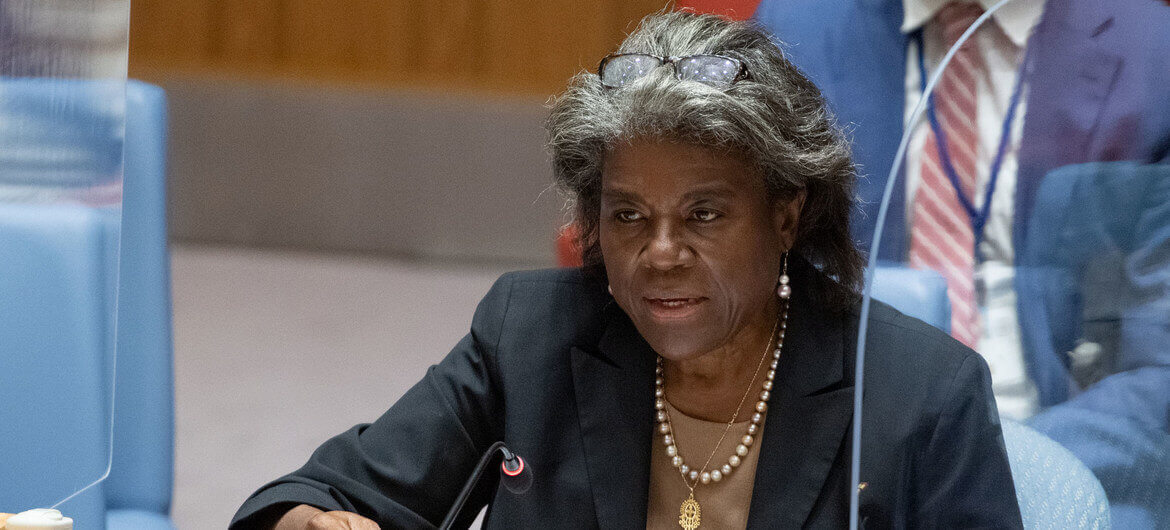The United Nations Security Council (UNSC) passed a resolution on Monday urging the Taliban to facilitate safe passage for people wishing to leave Afghanistan, “allow humanitarians to access the country, and uphold human rights, including for women and children.”
Resolution 2593 also puts in place counter-terrorism measures. In this regard, the Council demanded that “Afghan territory should not be used to threaten or attack any country, or to shelter or train terrorists, or to plan or finance terrorist acts.”
The resolution was drafted by the United States (US), the United Kingdom (UK), and France and was passed with a majority of 13 out of 15 votes in favour, with China and Russia abstaining.
In the weeks following the Taliban’s swift capture of Kabul, China and Russia were among the few nations that sought to cooperate with the group and promote peace and stability in the region. Others from the international community have refused to recognise the Taliban as a legitimate power in Afghanistan.
At the Council meeting, the attending countries condemned the violence and chaos in Afghanistan ever since the Taliban takeover, particularly the suicide bombing last Thursday that killed over 200 people.
The resolution also recalled the Taliban’s statements from August 27, when the group claimed that “Afghans would be able to travel abroad, and leave Afghanistan any time they want to, including by any border crossing, both air and ground.”
“The Security Council expects the Taliban to live up to its commitment to facilitate safe passage for Afghans and foreign nationals who want to leave Afghanistan, whether it’s today, tomorrow, or after August 31,” US Ambassador Linda Thomas-Greenfield said. “It underscores that all parties need to facilitate humanitarian assistance and that humanitarian actors be given full safe and unhindered access to continue service delivery to those in need,” she added.
The US concluded its evacuation mission in Afghanistan on Monday as per the scheduled August 31 deadline set by President Joe Biden. Post the withdrawal, Biden addressed the public and stressed the US efforts towards the enforcement of the UNSC resolution, which will continue to manifest free of any deadlines. “The Taliban has made commitments on safe passage, and the world will hold them to their commitments,” Biden said.
Similarly, the Deputy Permanent Representative of France, Nathalie Estival-Broadhurst, supported Biden in emphasising the fulfilment of the Taliban’s commitment and the UNSC resolution. “This resolution calls on everyone to make all efforts to secure the airport and the surrounding area. To create this safe passage and protection is a sine qua non condition to ensure that threatened Afghans who wish to leave can do so safely, but also to ensure that humanitarian assistance can reach all of those who need it through the airport, of course, but also overland borders,” she stated.
Furthermore, the UK’s Ambassador, Barbara Woodward, called for a consolidated international response towards mitigating the dire situation in Afghanistan. She highlighted the significance of safeguarding Afghan women and children and ensuring safe passage for civilians. “We will continue to build on this to ensure the Council holds the Taliban accountable on its commitments,” Woodward said, adding, “The international community will judge the Taliban based on their actions on the ground, not their words.”
However, Russian Ambassador Vassily Nebenzia pointed out certain “principled concerns” in the draft resolution. Nebenzia said: “Despite the fact that the resolution was proposed against the backdrop of a terrible terrorist attack, the authors categorically refused to refer to a passage on the fight against terrorism containing internationally recognised terrorist organisations ISIL and the East Turkistan Islamic Movement. We (Russia) see this as reluctance to acknowledge the obvious and a desire to divide terrorists into ‘ours’ and ‘theirs’; that is to say, to downplay terrorist threat coming from these groups.”
Likewise, China cited the uncertainties surrounding the resolution for abstaining from it. “We hope that relevant countries will realise the fact that withdrawal is not the end of responsibility, but the beginning of reflection and correction,” Chinese Ambassador Geng Shuang said.
Moreover, Al Jazeera mentioned that French President Emmanuel Macron expected a more well-defined resolution to establish a ‘safe zone’ in Kabul and allow humanitarian operations to continue. However, the resolution made no mention of establishing a safe zone.
Richard Gowan, a UN expert at the International Crisis Group, called the resolution a “thin text” that aims to send across a political signal to the Taliban to live up to their commitments and maintain peace and order in Afghanistan. “Macron was guilty of overselling the idea of a safe zone at Kabul airport this weekend, or at least not communicating very clearly,” Gowan said, adding that the resolution is inclusive of all humanitarian concerns.
Meanwhile, on Tuesday, India, which is considerably involved in Afghan evacuation and resettling efforts, also extended its support for the resolution. “The resolution underlines terrorist individuals and entities designated by UN Security Council [Resolution] 1267. It is of direct importance to India,” Indian Foreign Secretary Harsh Vardhan Shringla said after the UNSC meeting.
UN Security Council Urges Taliban to Allow People to Leave Afghanistan
The United Nations Security Council passed a resolution on Monday demanding that the Taliban facilitate “safe passage” out of Afghanistan for those wanting to leave the country.
August 31, 2021

Ambassador Linda Thomas-Greenfield of the United States addresses the UN Security Council meeting on the situation in Afghanistan on Monday. SOURCE: UN PHOTO/ESKINDER DEBEBE
